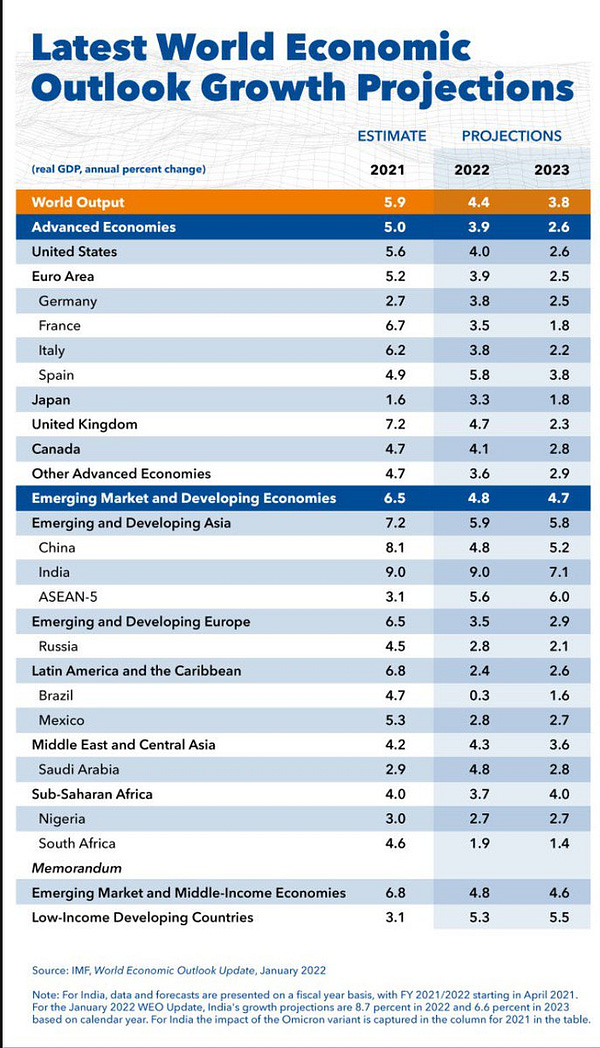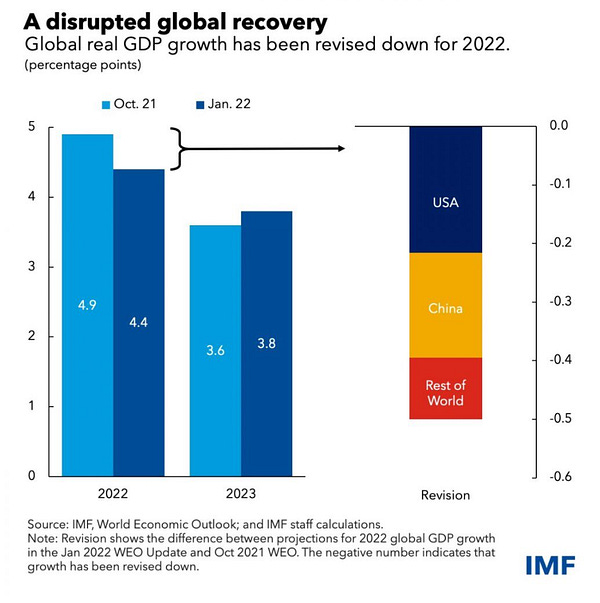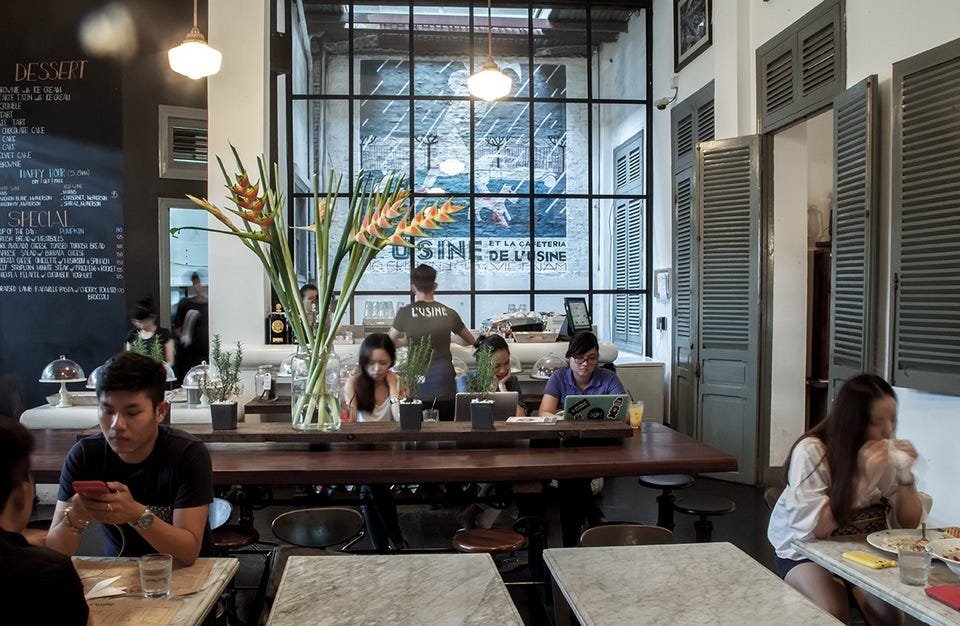Emerging Markets Daily - January 26
Foreign Investors Flee Key Asian Markets, Airlines 'Optimistic' For '22, Asia's Coffee Revolution, New Pan-African Airline Brewing, IMF to El Salvador: Drop Bitcoin
The Top 5 Stories Shaping Emerging Markets from Global Media - January 26
Foreign Investors Flee Key Asian Markets Ahead of Fed Meeting
“Overseas funds have sold a net $3.1 billion worth of shares in Taiwan, South Korea and India so far this week, according to the latest available data compiled by Bloomberg. That follows $4.9 billion of withdrawals last week, the largest since August.”
Bloomberg
“Foreigners are cutting and running in some key Asian emerging markets amid turbulent trading ahead of this week’s Federal Reserve meeting, where policymakers are expected to signal an interest-rate liftoff in March.”
“Overseas funds have sold a net $3.1 billion worth of shares in Taiwan, South Korea and India so far this week, according to the latest available data compiled by Bloomberg. That follows $4.9 billion of withdrawals last week, the largest since August.”
“…The MSCI Asia Pacific Index has lost more than 5% in two weeks, as rising bets on faster-than-expected monetary tightening and heightened tensions over Ukraine roiled global stock markets. Benchmarks in Taiwan and Korea have suffered with their large tech exposure, with the sector bearing the brunt of the selloff as bond yields rose.”
“Some Southeast Asian markets that have relatively low exposure to tech names have bucked the trend of outflows. Foreigners have been net buyers in small amounts in Indonesia, Malaysia, Thailand and Vietnam so far this week.”
“In India, where the benchmark stock gauge slumped the most in two months on Monday, consumer technology names were among the biggest losers.” Bloomberg reports.
Global Airlines ‘Optimistic’ About 2022 Outlook
The National
“The global airline industry is ‘optimistic’ about the outlook for air travel in 2022 as Omicron-related restrictions are eased or removed, and after annual passenger traffic recovered to 42 per cent of 2019 levels last year and cargo volumes rose 7 per cent from 2019.”
“Domestic travel led the passenger traffic recovery in 2021, which was down 28 per cent from 2019 levels, while international trips recovered more slowly to 75.5 per cent below pre-pandemic levels, with Asia-Pacific lagging behind other regions due to border closures, the International Air Transport Association (Iata) said in an online press briefing on Tuesday.”
“Overall passenger demand fell by 58.4 per cent in 2021 compared with 2019.”
“Air cargo volumes recorded a strong performance in 2021, rising 18.7 per cent from 2020, making it an important source of revenue and cash for airlines. The outlook for cargo ‘continues to be positive’ in 2022, despite supply chain disruptions triggered by the pandemic, which are expected to ease from record-high levels.”
“‘We're ending the year generally in better shape than we started the year,’ Willie Walsh, Iata's director general, said. ‘Going into 2022, I think there will be a short-term impact as a result of government restrictions in response to the Omicron variant that we've seen since the end of November. But more and more governments are reviewing those restrictions, and we’re pleased to see that some if not all are beginning to be relaxed or removed. That's a positive indication for the industry.’” Deena Kamel reports.
Asia’s Coffee Revolution
Nikkei Asia
“Not a day goes by without a cup of coffee for Leo Hao, a native of Shanxi Province in China now working in Shanghai. The branding executive used to drink tea but switched to coffee in 2013 under the influence of his then-girlfriend, who is now his wife.”
"‘I got hooked by the fact that coffee could be both cheap and tasty,’ recollected Hao, 32, who brews his own but also consumes coffee from the growing number of coffee outlets across China's cities.”
“Hao is part of the reason why Asia's coffee consumption has grown by 1.5% in the past five years, compared to 0.5% growth in Europe and 1.2% in the U.S, according to the International Coffee Organization, turning the region into the coffee world's soon-to-be center of gravity. Traditionally a tea-drinking region, Asia's growing coffee consumption is largely driven by the rise of a middle class that is keen to try anything trendy.”
“But coffee is about more than disposable incomes and caffeine addictions. It is a cultural phenomenon as well -- wrapped up in a long legacy of colonialism and imported Western influence, from Meiji Japan to colonial Vietnam to Dutch coffee plantations in Sumatra.”
“In China, for example, coffee is now a barometer of Western influence, brought back home mainly by people who studied abroad. Hao's wife acquired a taste for coffee in the Netherlands before returning to China.”
“…spurred on by the COVID-19 pandemic, Asian coffee drinkers' appetite for a more locally-produced caffeine hit has been growing in recent years. Domestic coffee producers own more of the value chain and indigenous coffee cultures are starting to rival Western imports like Starbucks and Costa. Currently, Asia produces 29% of the world's coffee beans, but the region (including Oceania) consumes only 22% of them.”
“Iman Kusumaputra, co-founder of Kopikalyan, an Indonesian coffee shop chain, is one of many coffee proprietors in Asia who see a massive business opportunity in balancing these numbers out. ‘Our vision is to become the first [international] coffee chain from a coffee-producing nation,’ he told Nikkei.”
“Vietnam has been a coffee colossus in its own right, ever since French colonizers first harvested the crimson cherries (a fond nickname for the fruit of the coffee tree) in the 19th century. So deep-seated is coffee in Vietnamese culture that the crop has been integrated into the local lexicon: Bribes are ‘coffee money,’ and to socialize is to go ca phe ca phao…Today, that legacy has helped Vietnam to become both the world's top robusta exporter and a cafe society. Nikkei Asia reports.
See Also, our Column - Globalization in a Mug
New Pan-African Airline Prepares for 2023 Liftoff
Africa Confidential
“Officials in Nairobi and Johannesburg are working with new investors for the launch next year of the biggest airline alliance in Africa after two years of crashing revenues in business travel and tourism.”
“Regional governments and the World Bank are predicting a modest upturn in both areas this year. In the medium term, the aviation sector in Africa, the second biggest continent after Asia, is forecast to be one of the fastest-growing in the world.”
“But battered by the Covid-19 pandemic, African airlines have projected combined losses of $8.2 billion in 2021. That's $2bn less than the losses in 2020. The Strategic Partnership Framework signed by Kenya Airways (KQ) and South African Airways (SAA) last November was seen by policy-makers as a rational response to the financial pressures hitting the sector.”
“It was meant to lay the basis for a new continental airline, making the most of bases in two of Africa's busiest commercial hubs, Nairobi and Johannesburg. So far, neither company will be drawn on how the merged entity will operate.”
“Interested investors have been gauging the level of support from the two countries' treasuries which are both struggling with revenue shortfalls and rising debts.”
“…The proposed merger to form a Pan African airline could help keep both airlines afloat and widen their reach, through tie-ups with smaller local carriers, and boost their passenger traffic and cargo business.” Africa Confidential reports.
IMF Urges El Salvador to Drop Bitcoin as Legal Tender
“Bukele became a darling of the cryptocurrency’s promoters and has since spoken of building a Bitcoin city and issuing Bitcoin-backed bonds, something else some IMF directors expressed concern over.”
Associated Press
“The International Monetary Fund wants El Salvador to drop the highly volatile cryptocurrency Bitcoin as legal tender and strictly regulate the electronic wallet the government has pushed adoption of across the country.”
“The global lender’s board ‘urged the authorities to narrow the scope of the Bitcoin law by removing Bitcoin’s legal tender status,’ the IMF said in a statement Tuesday. ‘The adoption of a cryptocurrency as legal tender, however, entails large risks for financial and market integrity, financial stability and consumer protection,’ the IMF statement said.”
“President Nayib Bukele led the push to adopt Bitcoin as legal tender alongside the U.S. dollar. El Salvador’s Legislative Assembly made the country the first to do so in June. After nearly doubling in value late last year, Bitcoin has plunged and on Tuesday was slightly below where it was when the congress voted June 9. The bitcoin law went into effect in September.”
“El Salvador’s law called for all businesses — with the technological ability — to accept Bitcoin as payment. The rollout was glitchy, but seems to have smoothed out.”
“Bukele became a darling of the cryptocurrency’s promoters and has since spoken of building a Bitcoin city and issuing Bitcoin-backed bonds, something else some IMF directors expressed concern over.”AP reports.
Emerging Markets Twitter
Follow of the Day - Follow @EhsanKhoman on Twitter for always sharp insights and his own regular Top 5 lists of the key issues shaping EM.





“Success is not final, failure is not fatal: it is the courage to continue that counts.”
― Winston S. Churchill







